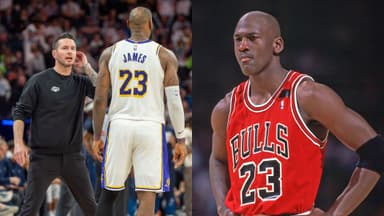By the mid-2000s, Michael Jordan had long retired from the NBA. He had traded in his basketball jerseys for a suit and taken on the role of owner of the Charlotte Hornets. But did he lose his golden touch? Not at all. The story of him lacing up his sneakers and dominating his own players in practice is 100% true. Former NBA star Raymond Felton recently shared an anecdote of the same.
Advertisement
Many members of the 2009–10 Charlotte Bobcats have spoken about this moment before, including Stephen Jackson. The story goes that “His Airness” was furious with how poorly the team was performing, so he challenged the players to a 1-on-1. According to Jackson, they got destroyed—not once, but twice.
Paul George, on his Podcast with P, asked Felton (another ex-Bobcat) about the same during their segment. He wondered whether an MJ in his 40s won every single time.
“He had to walk away with some Ls, right? Like he wasn’t just winning?” asked George. Felton, however, did not sugarcoat his response.
“We were scoring on him. But he won the games,” he said, which made both him and George laugh. “Somebody else might tell a different story, but from what I remember…we lost.”
This prompted one of Patrick’s co-hosts to ask what moves the much older Jordan was using to school the young bloods on the Bobcats. And if you were expecting the six-time NBA champion to pull out something new, you’d be wrong.
“Same post up, fadeaway. Anything you want, he was still doing it at that age,” revealed Felton. “It was crazy. He did whatever he wanted to do.”
It really shouldn’t matter that Jordan went back to his old tricks to beat the players who worked for him. Did it help their confidence? Who knows? They could’ve done something about it. Win, for starters.
Felton defends MJ as an owner: “A lot of people don’t understand.”
In that same interview, Felton said something about Jordan that few others have—he defended Jordan’s time as an owner, a role MJ continues to receive a lot of flak for to this day.
“A lot of people give him dirt about being an owner, but a lot of people don’t understand it’s not easy,” he said. Felton pointed out that sometimes things simply don’t work out with players, and that shouldn’t always fall on the person making the moves.
“You’re taking a chance on drafting kids and signing people in free agency. You just don’t know how things are going to pan out,” he added.
MJ’s run as the Bobcats’ owner didn’t reflect the dominance he displayed as a player. The team often struggled, frequently finishing near the bottom of the standings. Still, his commitment to Charlotte and North Carolina never wavered—a legacy defined more by loyalty than wins.







